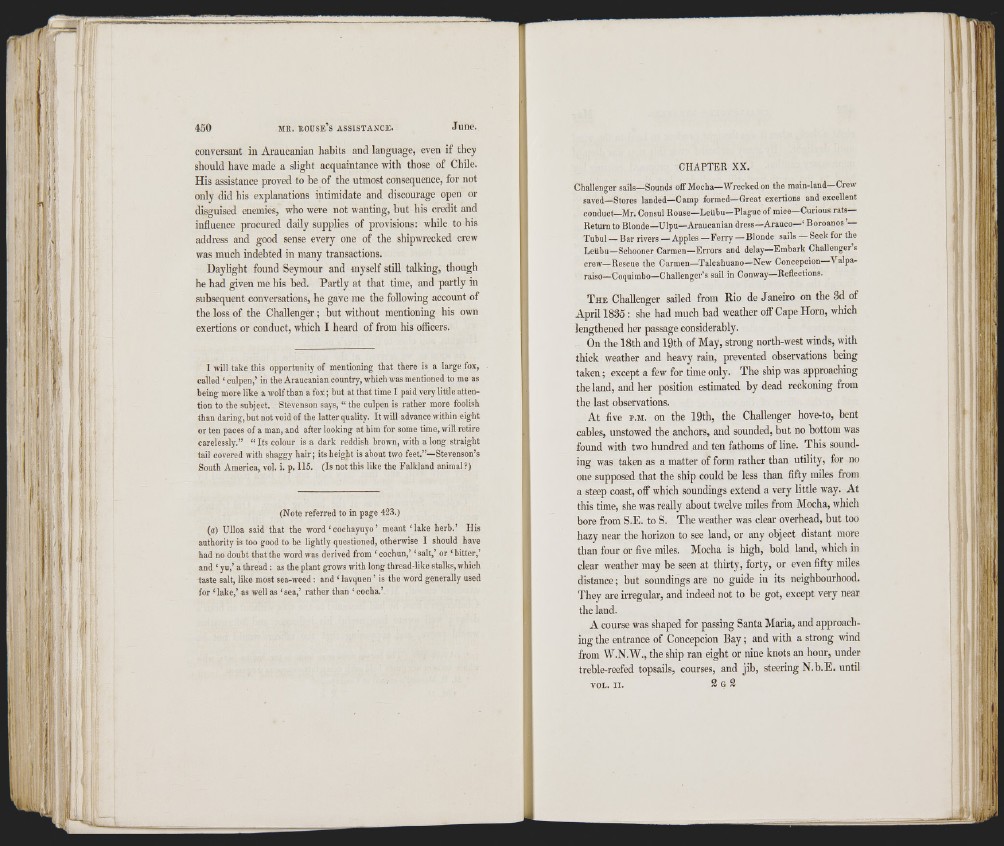
U' is
)
450 MB. BOUSE S ASSISTANCE. June.
conversant in Araucanian habits and language, even if they
should have made a slight acquaintance with those of Chile.
His assistance proved to be of the utmost consequence, for not
only did his explanations intimidate and discourage open or
disguised enemies, who were not wanting, but his credit and
influence procured daily supplies of provisions: while to his
address and good sense every one of the shipwrecked crew
was much indebted in many transactions.
Daylight found Seymour and myself still talking, though
he had given me his bed. Partly at that time, and partly in
subsequent conversations, he gave me the following account of
the loss of the Challenger ; but without mentioning his own
exertions or conduct, which I heard of from his officers.
I will take this opportunity of mentioning that there is a large fox,
called ‘ culpen,’ in the Araucanian country, which was mentioned to me as
heing more like a wolf than a fox; but at that time I paid very little attention
to the subject. Stevenson says, “ the culpen is rather more foolish
than daring, but not void of the latter quality. It will advance within eight
or ten paces of a man, and after looking at him for some time, will retire
carelessly.” “ Its colour is a dark reddish brown, with a long straight
tail covered with shaggy hair; its height is ahout two feet.”—Stevenson’s
South America, vol. i. p. 115. (Is not this like the Falkland animal?)
(Note referred to in page 423.)
(a) Ulloa said that the word ‘ cochayuyo ’ meant ‘ lake herb.’ His
authority is too good to be lightly questioned, otherwise I should have
had no doubt that the word was derived from ‘ cochun,’ ‘ salt,’ or ‘ bitter,’
and ‘ yu,’ a thread : as the plant grows with long thread-like stalks, which
taste salt, like most sea-weed : and ‘ lavquen ’ is the word generally used
for ‘ lake,’ as well as ‘ sea,’ rather than ‘ cocha.’
CHAPTER XX.
Challenger sails—Sounds off Mocha—Wrecked on the main-land—Crew
saved—Stores landed—Camp formed—Great exertions and excellent
conduct—Mr. Consul Rouse—LeUbu—Plague of mice—Curious rats—
Return to Blonde—Ulpu—Araucanian dress—Arauco—‘ Boroanos ’—
Tubul — Bar rivers — Apples — Ferry — Blonde sails — Seek for the
Letibu—Schooner Carmen—Errors and delay—Embark Challenger’s
crew—Rescue the Carmen—Talcahuano—New Concepcion—Valparaiso—
Coquimbo—Challenger’s sail in Conway—Reflections.
T h e Challenger sailed from Bio de Janeiro on the 3d o f
April 1835 : she had much bad weather o f f Cape Horn, which
lengthened her passage considerably.
On the 18th and 19th of May, strong north-west winds, with
thick weather and heavy rain, prevented observations being
taken; except a few for time only. The ship was approaching
the land, and her position estimated by dead reckoning from
the last observations.
At five P.M. on the 19th, the Challenger hove-to, bent
cables, unstowed the anchors, and sounded, but no bottom was
found with two hundred and ten fathoms of line. This sounding
was taken as a matter of form rather than utility, for no
one supposed that the ship could be less than fifty miles from
a steep coast, off which soundings extend a very little way. At
this time, she was really about twelve miles from Mocha, which
bore from S.E. to S. The weather was clear overhead, but too
hazy near the horizon to see land, or any object distant more
than four or five miles. Mocha is high, bold land, which in
clear weather may be seen at thirty, forty, or even fifty miles
distance; but soundings are no guide in its neighbourhood.
They are irregular, and indeed not to be got, except very near
the land.
A course was shaped for passing Santa Maria, and approaching
the entrance of Concepcion Bay; and with a strong wind
from W.N.W., the ship ran eight or nine knots an hour, under
treble-reefed topsails, courses, and jib, steering N.b.E. until
VOL. I I . 3 G 2
ji i t i
1^
a. ,
III
11-
a j t
1 if fe: M
¡'■Hi,.
7 !